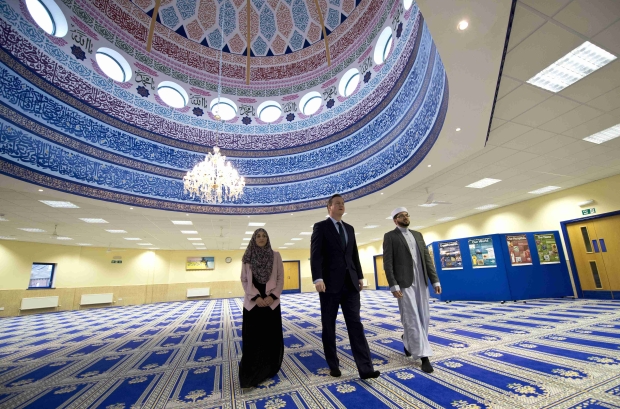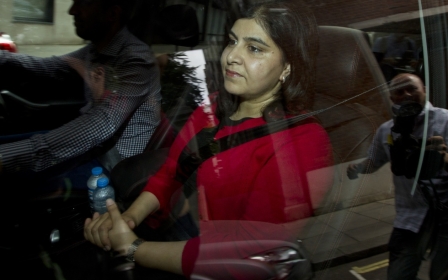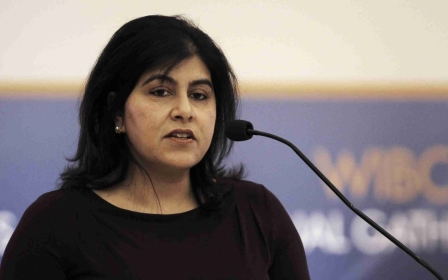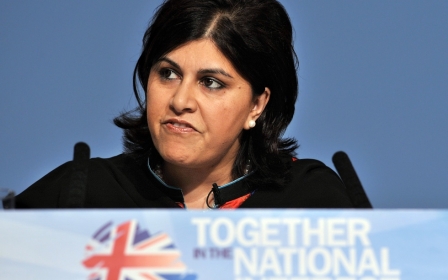Prosecute British who fight with the Israeli army, says Baroness Warsi

Sayeeda Warsi, who resigned her cabinet post over the UK government’s failure to condemn Israel’s assault on Gaza, has called for British volunteers for the Israeli army to be treated as foreign fighters and prosecuted on their return to the UK.
The former foreign office minister, who now holds the title of baroness in the House of Lords, seeks to close a loophole she says is designed to protect Israel. It distinguishes between Britons who fight for state armies like Israel and Pakistan, and those who fight for non-state groups like Kurdish and militant organisations.
In an interview with the Middle East Eye, Warsi said: “One of the questions I asked the Foreign Office was that we have a distinction between state actors and non-state actors.
“If you go out there and fight for any group, you will be subject to prosecution when you get back. If you go out and fight for Assad, I presume, under our law, that is okay. That can't be right.”
“The only reason we allow the loophole to exist is because of the IDF [Israel Defence Forces], because we are not brave enough to say if you hold British citizenship, you make a choice. You fight for our state only. That has to go out strong.”
Warsi, the UK's first female Muslim cabinet minister, said that while public debate focused exclusively on demanding loyalty from British Muslims, the same rule should apply to all.
READ: Warsi on Gaza, cabinet clashes and being called the 'enemy within'
“You have to belong to something and belonging to Britain for Muslims is a thing we talk about a lot,” she said. “We don't talk about it in relation to other communities. We accept that other communities hold multiple identities. Let's just shut down this loophole. If you don't fight for Britain, you do not fight."
Dozens of British citizens are currently volunteered to the Israeli Army (IDF) through its Mahal programme. A spokesperson for Mahal told MEE that the exact number was a state secret and referred enquiries to the Ministry of Defence.
'War crimes' in Gaza
Warsi told MEE that she believed Israel had committed war crimes in its attack on Gaza in 2014 when she was part of David Cameron’s coalition government. More than 2,200 Gazans were killed during Operation Protective Edge and 10,000 wounded.
“I fundamentally believe that our policy towards Israel is flawed,” she said. “If you go back to statements that [then-foreign secretary] William Hague made, at the time of the recognition of Palestine as a state, the government said not now, maybe in six months' time.
“Now we are four or five years forward. What's changed? The settlements are still being built. There is no formal recognition [of Palestine], the peace process is no further forward. The reality on the ground is changing.”
Theresa May, she said, had shown a “real lack of moral courage and leadership” by failing to attend the Paris peace conference in January and blocking the EU from adopting its closing statement.
Speaking about the publication of her book The Enemy Within, Warsi addressed for the first time her decision to resign. She said she anguished over her relationship with Cameron and that, had William Hague still been foreign secretary, then she might not have gone. But she said that then-foreign secretary Philip Hammond’s lack of interest in human rights made it a “whole lot easier” for her to quit.
'People were tabling questions on Gaza on a daily basis, as the situation was escalating, and I had to repeat government lines'
- Sayeeda Warsi
“I was the minister for human rights, the minister for the UN, the minister for ICC,” said Warsi. “We were debating how we should vote at the Human Rights Council and what is our position on human rights violations.
“I was being sent off to the House of Lords also on a daily basis. People were tabling questions on Gaza on a daily basis, as the situation was escalating, and I had to repeat government lines. It came to the moment when I said enough is enough.
“For me, it was a very personal decision. High office is there to make a difference… What mattered to me was being in a position to make a difference, but when you are in a position that you are no longer making a difference, it's probably doing more harm by remaining there. A lot of people said to me 'disagree and stay' but I think that's hypocrisy.”
Cameron: From liberal to neocon
In her book, Warsi reveals how her special adviser was approached by a member of the Conservative Party to spy on her.
Warsi refused however to name the person involved. “I don't want to name names,” she said. “He wasn't a civil servant. He wasn't actually security cleared. He was not government, just an ordinary private citizen.” She said she had no idea who sent him, but was sure it was not Cameron. “They asked him to keep an eye on me, on whom I saw, and whom I did not see.”
It was the Spectator columnist Douglas Murray who called Warsi “the enemy at the table” - but the split in cabinet was evident.
“It is a well-known fact that there was a tussle between my view, which is that radicalisation is not all about ideology, that there are many journeys to radicalisation and the opposing view that it is about ideology,” she said. “There was a difference of opinion between where government policy was going, and people like me, Ken Clarke, Dominic Grieve and Nick Clegg. Of those I was the only Muslim.”
Of Murray she said: “Douglas Murray called me the enemy within. He thinks there is a terrorist behind every chair. He has a view that every Muslim is part of the problem.”
While Warsi said she trusted the intelligence services for their “evidence-based “ approach, the gap grew between her and her cabinet colleagues.
'It is a well-known fact that there was a tussle between my view, which is that radicalisation is not all about ideology... and the opposing view that it is about ideology'
- Sayeeda Warsi
Today she accuses May’s government of disengaging with British Muslims and of being unable to treat their representatives in the way in which they treat the leaders of Britain’s other faith groups.
“One of them is how we do festivals and how we do celebrations. A Muslim [invite] list is sent off to all sorts of people to check and double check. We do not do that for anybody else. There is a reality, it has to be documented,” Warsi said.
And she fears for the the future: “I suppose I grew up in a racist world. I have done my bit. My grandfathers both served in the British Indian army. My parents broke their backs in Dewsbury. I served my country at the top table. How many generations are going to give their loyalty before you stop saying to us 'prove you are loyal'.
“I am just about to become a grandmother. But will Britain be home to my grandchildren? It would be a tragedy if my grandchildren checked out of Britain.”
Middle East Eye propose une couverture et une analyse indépendantes et incomparables du Moyen-Orient, de l’Afrique du Nord et d’autres régions du monde. Pour en savoir plus sur la reprise de ce contenu et les frais qui s’appliquent, veuillez remplir ce formulaire [en anglais]. Pour en savoir plus sur MEE, cliquez ici [en anglais].







